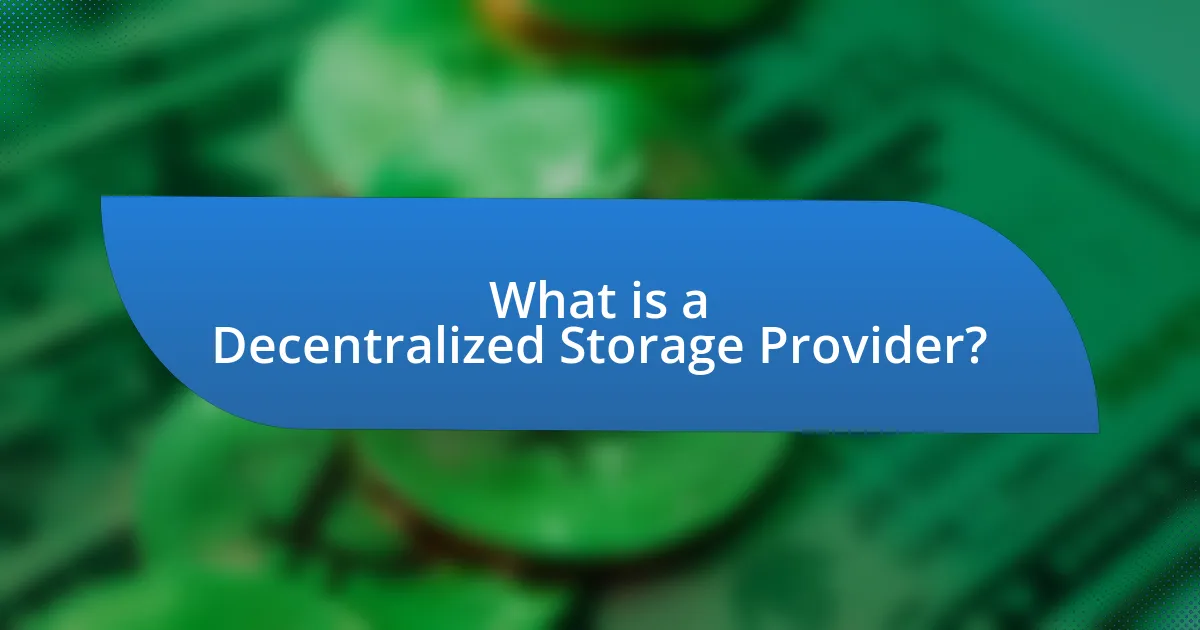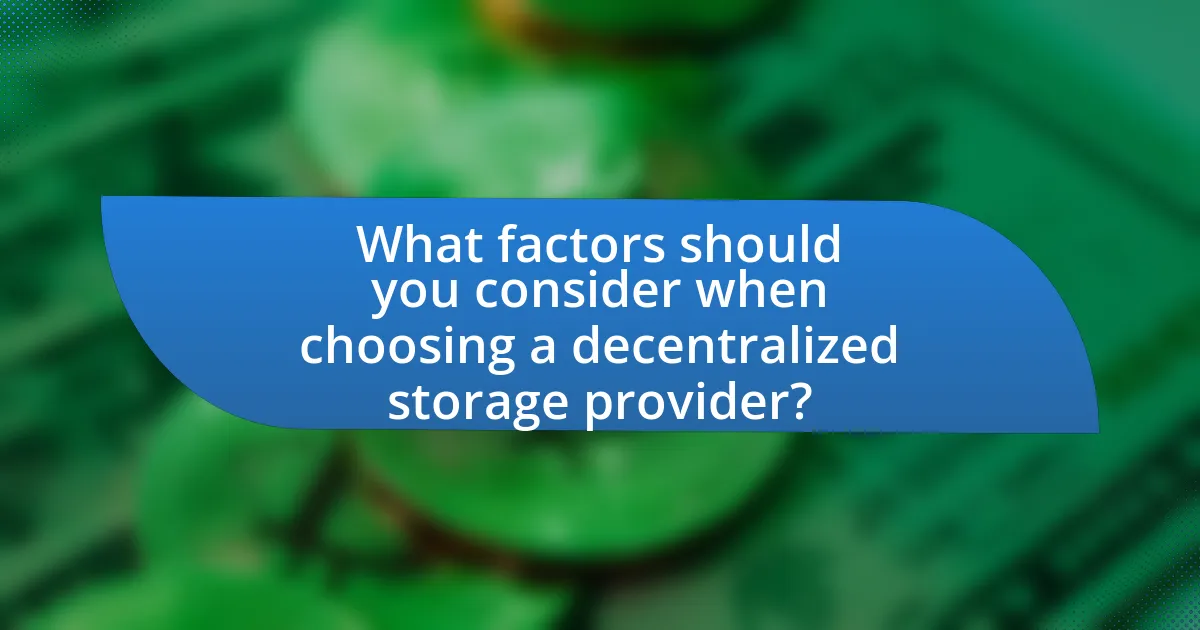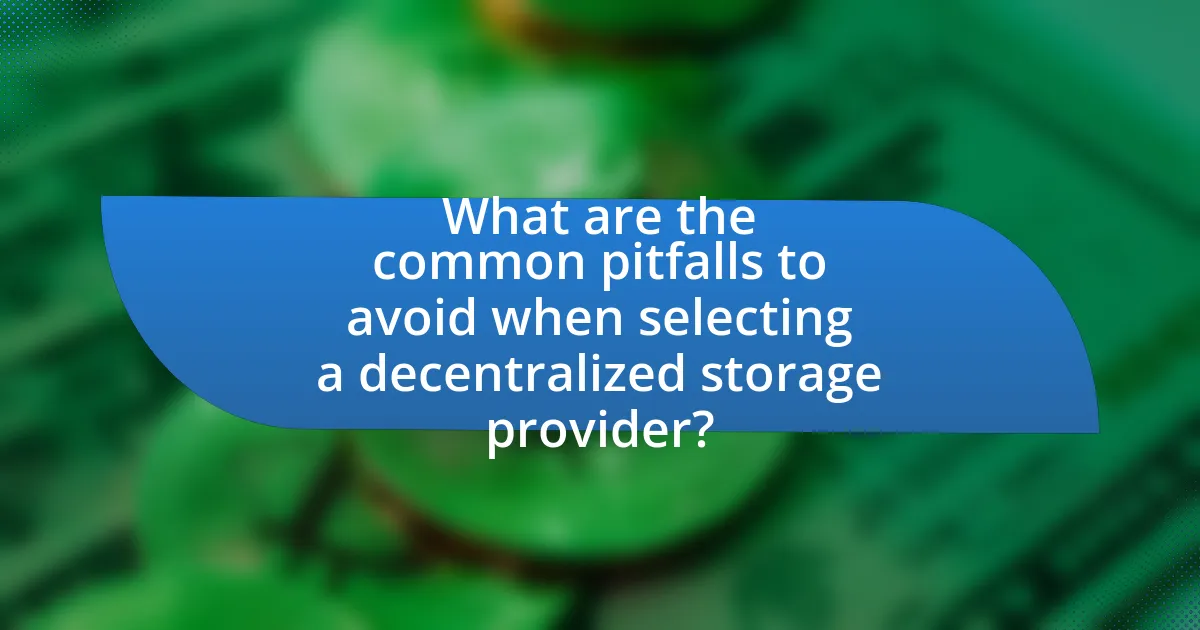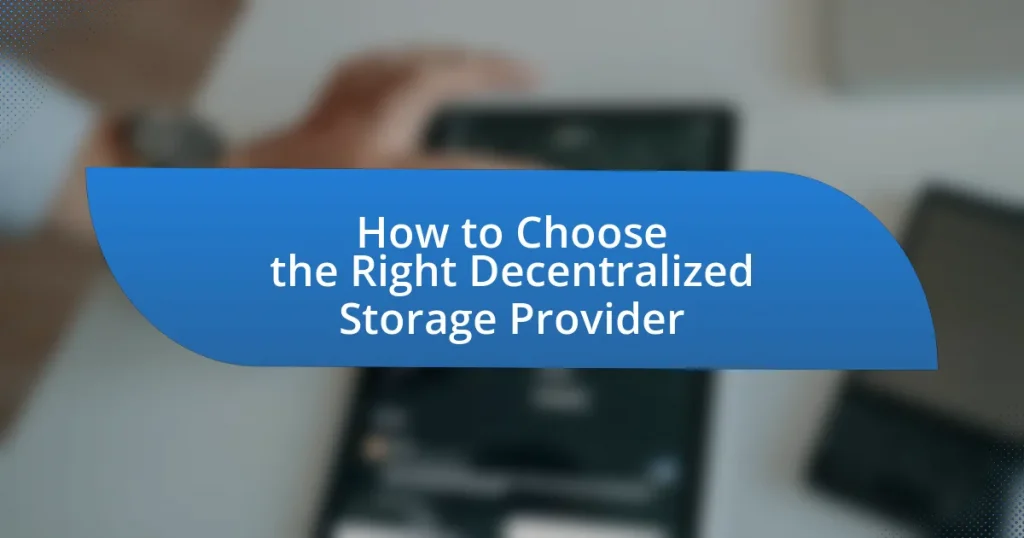A decentralized storage provider is a service that allows users to store data across a distributed network, enhancing security and availability compared to traditional centralized storage solutions. This article outlines the key features and technologies that underpin decentralized storage, such as blockchain and peer-to-peer networking, while emphasizing the importance of data security, redundancy, and user control. It also discusses factors to consider when choosing a provider, including pricing models, customer support, and compliance with regulations. Additionally, the article highlights common pitfalls to avoid and best practices for evaluating potential providers to ensure informed decision-making in selecting a decentralized storage solution.

What is a Decentralized Storage Provider?
A decentralized storage provider is a service that enables users to store data across a distributed network of nodes rather than on a centralized server. This model enhances data security and availability, as it reduces the risk of data loss or unauthorized access associated with single points of failure. For instance, platforms like IPFS (InterPlanetary File System) and Filecoin utilize blockchain technology to ensure that data is stored in a manner that is both resilient and tamper-proof, allowing users to retrieve their information from multiple locations.
How does decentralized storage differ from traditional storage solutions?
Decentralized storage differs from traditional storage solutions primarily in its architecture and data management approach. Traditional storage solutions typically rely on centralized servers, where data is stored in a single location, making it vulnerable to failures, breaches, and data loss. In contrast, decentralized storage distributes data across multiple nodes in a network, enhancing security and redundancy. For instance, platforms like IPFS (InterPlanetary File System) utilize a peer-to-peer network to store and retrieve data, ensuring that even if some nodes go offline, the data remains accessible. This decentralized model not only improves resilience but also promotes user control over data, as individuals retain ownership without relying on a single entity.
What technologies underpin decentralized storage systems?
Decentralized storage systems are primarily underpinned by blockchain technology, peer-to-peer networking, and cryptographic protocols. Blockchain technology ensures data integrity and security through distributed ledgers, while peer-to-peer networking allows users to share storage resources directly without intermediaries. Cryptographic protocols enhance data privacy and security by encrypting files before they are stored, ensuring that only authorized users can access the data. These technologies collectively enable a resilient, secure, and efficient decentralized storage environment.
How do decentralized storage providers ensure data security?
Decentralized storage providers ensure data security through encryption, redundancy, and distributed architecture. They encrypt data before it is uploaded, ensuring that only authorized users can access it. Additionally, these providers distribute data across multiple nodes, which reduces the risk of data loss and unauthorized access. For instance, platforms like IPFS and Filecoin utilize cryptographic hashing and sharding techniques to enhance security and integrity. This approach not only protects against data breaches but also ensures that data remains accessible even if some nodes go offline.
What are the key features of decentralized storage providers?
Decentralized storage providers offer key features such as data redundancy, enhanced security, and user control over data. Data redundancy ensures that files are stored across multiple nodes, minimizing the risk of data loss. Enhanced security is achieved through encryption and distributed architecture, making unauthorized access difficult. User control allows individuals to manage their own data without relying on a central authority, promoting privacy and autonomy. These features collectively enhance reliability and trust in decentralized storage solutions.
How do scalability and performance vary among providers?
Scalability and performance among decentralized storage providers vary significantly based on their underlying architecture and resource management strategies. Providers like Filecoin and Storj utilize decentralized networks that can dynamically scale with demand, allowing for efficient resource allocation and improved performance during peak usage times. In contrast, traditional cloud providers may face bottlenecks due to centralized infrastructure, limiting their scalability and potentially degrading performance under heavy loads. For instance, Filecoin’s unique incentive structure encourages more nodes to join the network, enhancing both scalability and performance, as evidenced by its ability to handle increasing data storage requests without compromising speed.
What role does data redundancy play in decentralized storage?
Data redundancy in decentralized storage enhances data availability and reliability. By storing multiple copies of data across various nodes, decentralized systems ensure that even if some nodes fail or become inaccessible, the data remains retrievable from other nodes. This approach mitigates the risk of data loss and improves fault tolerance, as evidenced by systems like IPFS and Filecoin, which utilize redundancy to maintain data integrity and accessibility.
Why is choosing the right decentralized storage provider important?
Choosing the right decentralized storage provider is crucial because it directly impacts data security, accessibility, and cost-effectiveness. A reliable provider ensures that data is encrypted and distributed across multiple nodes, minimizing the risk of data loss or unauthorized access. For instance, a study by the International Journal of Information Management highlights that decentralized storage solutions can reduce data breaches by up to 80% compared to traditional centralized systems. Additionally, the right provider offers scalability and performance, allowing users to efficiently manage growing data needs without incurring excessive costs. Therefore, selecting an appropriate decentralized storage provider is essential for safeguarding sensitive information and optimizing resource utilization.
What risks are associated with selecting an inadequate provider?
Selecting an inadequate provider poses significant risks, including data loss, security vulnerabilities, and poor service reliability. Data loss can occur if the provider lacks proper backup and recovery protocols, leading to irreversible damage to critical information. Security vulnerabilities arise from inadequate encryption and access controls, exposing sensitive data to breaches and unauthorized access. Additionally, poor service reliability can result in frequent downtimes and slow performance, disrupting business operations and affecting user experience. These risks highlight the importance of thoroughly evaluating a provider’s capabilities and reputation before making a selection.
How can the right provider enhance data accessibility and control?
The right provider can enhance data accessibility and control by implementing robust security protocols and user-friendly interfaces. These features ensure that users can easily access their data while maintaining control over permissions and sharing settings. For instance, providers that utilize encryption and decentralized architectures allow users to manage their data without relying on a central authority, thus reducing the risk of unauthorized access. Additionally, platforms that offer intuitive dashboards enable users to monitor and adjust their data settings in real-time, facilitating better management and oversight.

What factors should you consider when choosing a decentralized storage provider?
When choosing a decentralized storage provider, consider factors such as security, data redundancy, performance, cost, and user control. Security is paramount; ensure the provider uses strong encryption methods to protect data. Data redundancy is crucial for reliability; check if the provider replicates data across multiple nodes to prevent loss. Performance affects access speed; evaluate the provider’s network latency and bandwidth. Cost is a significant factor; compare pricing models to find one that fits your budget while meeting your needs. Lastly, user control is essential; ensure the provider allows you to manage your data and access permissions effectively.
How do pricing models impact your choice of provider?
Pricing models significantly influence the choice of a provider by determining the overall cost-effectiveness and value of the services offered. For instance, providers that utilize a pay-as-you-go model may appeal to users with fluctuating storage needs, as this model allows for flexibility and cost control. In contrast, flat-rate pricing can benefit users with predictable storage requirements, offering a clear understanding of monthly expenses. According to a study by Gartner, organizations that align their storage costs with usage patterns can reduce expenses by up to 30%. Therefore, understanding the pricing structure is crucial for selecting a provider that meets both budgetary constraints and service expectations.
What are the common pricing structures for decentralized storage?
Common pricing structures for decentralized storage include pay-per-use, subscription-based models, and tiered pricing. Pay-per-use charges users based on the amount of data stored and retrieved, allowing for flexibility and cost control. Subscription-based models offer a fixed monthly or annual fee for a set amount of storage, providing predictability in costs. Tiered pricing combines both approaches, offering different levels of service at varying price points, which can cater to different user needs and budgets. These structures are designed to accommodate the diverse requirements of users while ensuring scalability and efficiency in data management.
How can you evaluate the cost-effectiveness of different providers?
To evaluate the cost-effectiveness of different providers, compare their pricing structures against the services offered and the performance metrics. Analyze the total cost of ownership, which includes not only the subscription fees but also any additional costs such as data retrieval fees, bandwidth charges, and potential penalties for exceeding storage limits. For instance, a provider may offer a lower monthly fee but charge significantly for data access, making it less cost-effective in the long run. Additionally, assess the reliability and speed of the service, as higher performance can justify a higher cost. According to a study by Gartner, organizations that evaluate total cost of ownership can save up to 30% on cloud storage expenses by selecting the right provider based on comprehensive cost analysis.
What level of customer support should you expect from a provider?
You should expect a high level of customer support from a decentralized storage provider, characterized by 24/7 availability, multiple communication channels, and prompt response times. Providers often offer support through live chat, email, and phone, ensuring that users can receive assistance whenever needed. For instance, a study by Gartner indicates that companies with robust customer support systems see a 20% increase in customer satisfaction, highlighting the importance of accessible and effective support in the decentralized storage sector.
How can responsive customer support influence your experience?
Responsive customer support significantly enhances your experience by providing timely assistance and resolving issues efficiently. When customer support is responsive, it leads to quicker problem resolution, which can reduce downtime and frustration. According to a study by HubSpot, 90% of customers consider an immediate response as important when they have a customer service question. This responsiveness fosters trust and satisfaction, ultimately influencing customer loyalty and retention.
What support channels are typically available with decentralized storage providers?
Decentralized storage providers typically offer support channels such as community forums, documentation, email support, and live chat. Community forums allow users to engage with each other and share solutions, while comprehensive documentation provides detailed guides and FAQs for troubleshooting. Email support enables users to receive assistance directly from the provider, and live chat offers real-time help for urgent issues. These channels ensure users have access to various resources for resolving their concerns effectively.
How important is the provider’s reputation and track record?
The provider’s reputation and track record are critically important when selecting a decentralized storage provider. A strong reputation indicates reliability and trustworthiness, which are essential for ensuring data security and integrity. For instance, providers with a proven history of uptime and customer satisfaction are more likely to maintain high service standards. Research shows that 70% of consumers trust online reviews as much as personal recommendations, highlighting the significance of reputation in decision-making. Additionally, a provider’s track record can reveal their experience in handling data breaches or service outages, which directly impacts user confidence.
What metrics can you use to assess a provider’s reliability?
To assess a provider’s reliability, you can use metrics such as uptime percentage, data durability, and response time. Uptime percentage indicates the availability of the service, with a higher percentage reflecting greater reliability; for instance, a provider with 99.9% uptime is generally considered reliable. Data durability measures the likelihood that data will remain intact over time, often expressed as a percentage, such as 99.999999999% durability, which indicates a very low risk of data loss. Response time assesses how quickly the provider can respond to requests, with lower response times indicating better performance and reliability. These metrics collectively provide a comprehensive view of a provider’s reliability in decentralized storage solutions.
How can user reviews and testimonials guide your decision?
User reviews and testimonials can significantly guide your decision by providing real-world insights into the performance and reliability of decentralized storage providers. These reviews often highlight user experiences regarding data security, ease of use, and customer support, which are critical factors when selecting a provider. For instance, a study by BrightLocal in 2022 found that 91% of consumers read online reviews regularly, indicating their influence on purchasing decisions. By analyzing both positive and negative feedback, potential users can make informed choices based on the collective experiences of others, ensuring they select a provider that meets their specific needs and expectations.

What are the common pitfalls to avoid when selecting a decentralized storage provider?
When selecting a decentralized storage provider, common pitfalls to avoid include inadequate research on the provider’s reputation, overlooking data security measures, and ignoring the provider’s compliance with regulations. Inadequate research can lead to choosing a provider with a poor track record, which may result in data loss or breaches. Overlooking data security measures, such as encryption and redundancy, can expose sensitive information to unauthorized access. Ignoring compliance with regulations, like GDPR or HIPAA, can lead to legal issues and fines. Each of these pitfalls can significantly impact the reliability and safety of the storage solution.
What misconceptions might lead to poor choices?
Misconceptions about decentralized storage can lead to poor choices, such as the belief that all providers offer the same level of security and reliability. This misunderstanding can result in selecting a provider that lacks robust encryption or fails to implement adequate redundancy measures. For instance, a study by the International Journal of Information Management highlights that many users underestimate the importance of data integrity and availability, leading them to overlook critical factors when evaluating providers. Additionally, the assumption that decentralized storage is inherently more secure than traditional options can mislead users into neglecting necessary due diligence, ultimately compromising their data safety.
How can overemphasis on price lead to suboptimal decisions?
Overemphasis on price can lead to suboptimal decisions by causing individuals or organizations to overlook critical factors such as quality, reliability, and service. When price becomes the sole focus, decision-makers may select lower-cost options that compromise performance or security, ultimately resulting in higher long-term costs. For instance, a study by McKinsey & Company found that companies prioritizing cost over value often experience decreased customer satisfaction and increased churn rates, indicating that a narrow focus on price can detract from overall effectiveness and sustainability in the long run.
What are the dangers of ignoring data compliance and regulations?
Ignoring data compliance and regulations can lead to severe legal and financial repercussions for organizations. Non-compliance may result in hefty fines; for instance, the General Data Protection Regulation (GDPR) can impose penalties of up to 4% of annual global turnover or €20 million, whichever is higher. Additionally, organizations risk reputational damage, loss of customer trust, and potential lawsuits, which can further exacerbate financial losses. Furthermore, failure to comply with regulations can lead to operational disruptions, as organizations may be forced to halt services or undergo costly remediation efforts to address compliance gaps.
How can you ensure you are making an informed decision?
To ensure you are making an informed decision, conduct thorough research on the decentralized storage providers you are considering. This involves evaluating their security measures, data redundancy, user reviews, and compliance with regulations. For instance, a study by Gartner indicates that 70% of organizations that assess multiple providers report higher satisfaction with their chosen solution. Additionally, reviewing whitepapers and technical documentation can provide insights into the provider’s architecture and reliability, further supporting your decision-making process.
What resources are available for comparing decentralized storage providers?
Resources available for comparing decentralized storage providers include comparison websites, user reviews, and technical documentation. Websites like Filecoin, Storj, and Sia provide detailed comparisons of their services, features, and pricing. User reviews on platforms such as Reddit and Trustpilot offer insights into user experiences and satisfaction levels. Additionally, technical documentation and whitepapers from each provider present in-depth information about their technology, security measures, and performance metrics, enabling users to make informed decisions based on specific needs and requirements.
How can trial periods or demos help in your evaluation process?
Trial periods or demos facilitate informed decision-making by allowing users to assess the functionality and performance of decentralized storage solutions before committing. These evaluations enable potential users to experience the interface, speed, and reliability of the service, ensuring it meets their specific needs. For instance, a study by Gartner indicates that 70% of organizations that utilize trial periods report a higher satisfaction rate with their final choice, as they can directly compare features and usability against their requirements.
What are the best practices for selecting a decentralized storage provider?
The best practices for selecting a decentralized storage provider include evaluating security features, assessing data redundancy, and analyzing performance metrics. Security features such as encryption and access controls are crucial to protect sensitive data, as evidenced by the increasing number of data breaches in cloud storage solutions. Data redundancy ensures that files are stored across multiple nodes, enhancing reliability and availability; for instance, providers like Filecoin and Storj utilize distributed networks to achieve this. Performance metrics, including upload/download speeds and latency, should be tested to ensure they meet user requirements, as slow performance can hinder productivity. Additionally, reviewing the provider’s reputation and user feedback can provide insights into their reliability and service quality.
How can you create a checklist for evaluating potential providers?
To create a checklist for evaluating potential providers, identify key criteria that reflect your specific needs and requirements. These criteria should include factors such as provider reliability, security measures, scalability, cost-effectiveness, and customer support. For instance, assessing reliability can involve checking uptime statistics and user reviews, while security measures should encompass encryption standards and compliance with regulations like GDPR. Additionally, evaluating scalability ensures that the provider can accommodate future growth, and analyzing cost-effectiveness involves comparing pricing models against the services offered. Customer support evaluation can include response times and availability of support channels. This structured approach allows for a comprehensive assessment of potential providers, ensuring alignment with your decentralized storage needs.
What questions should you ask during the selection process?
During the selection process for a decentralized storage provider, you should ask questions that assess the provider’s security, reliability, scalability, and cost-effectiveness. Key questions include:
- What encryption methods do you use to protect data?
- How do you ensure data redundancy and availability?
- What is your uptime guarantee and how do you handle outages?
- Can you provide details on your pricing model and any hidden fees?
- How do you manage data access and permissions?
- What is your data recovery process in case of loss?
- Are you compliant with relevant data protection regulations?
These questions help evaluate the provider’s capabilities and ensure they meet your specific needs for secure and reliable decentralized storage.


